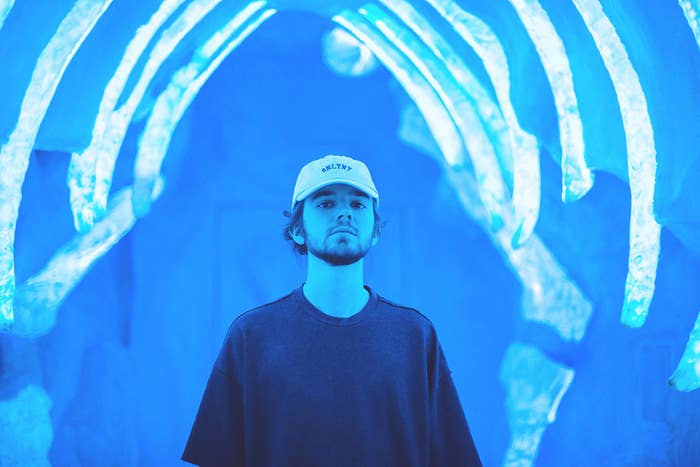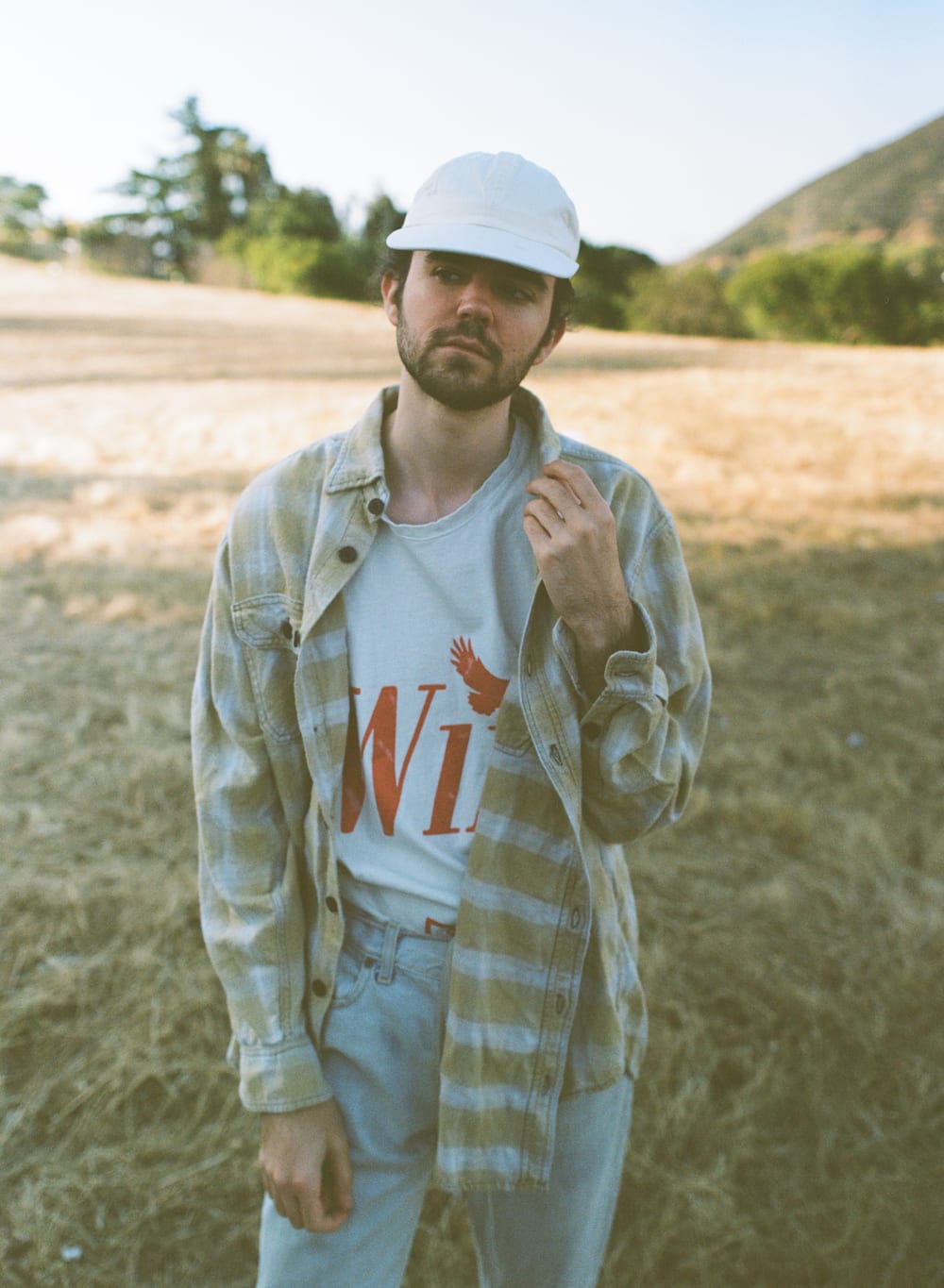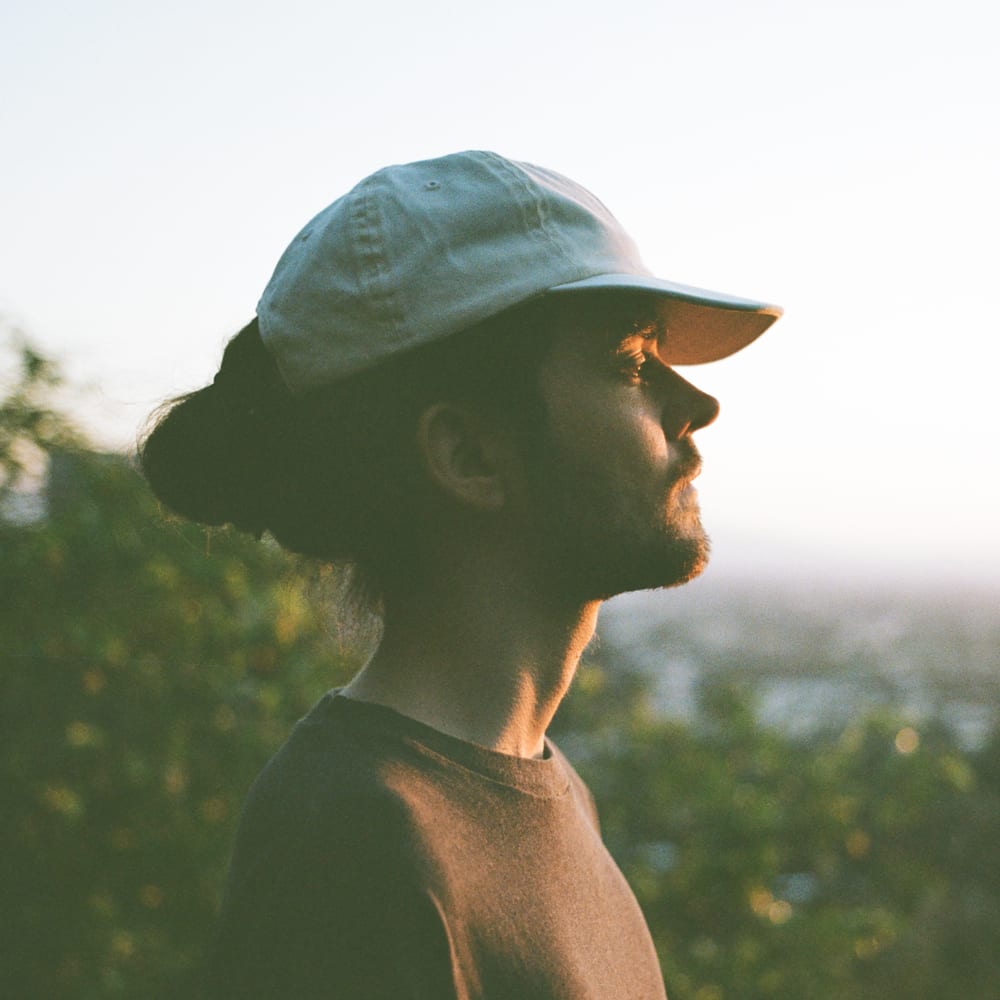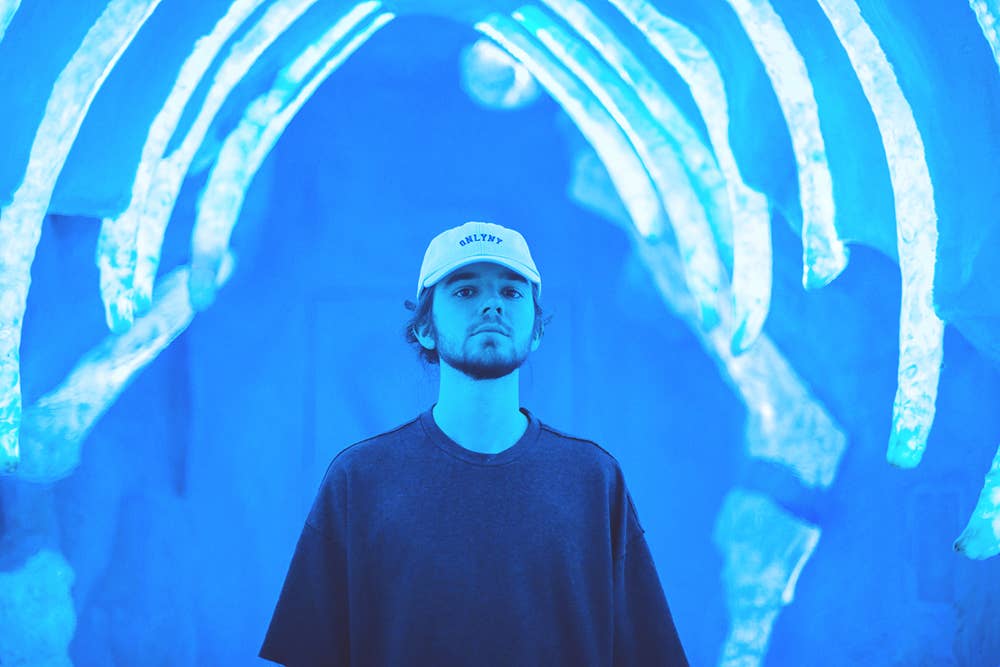
Madeon's had an intriguing career in the world of music thus far. I hesitate to say "electronic music" or "EDM," because what Madeon has been doing feels bigger than placing it into a dance music category—there's a reason why he calls his boutique imprint popcultur. He's been crafting some big poppy tunes since he emerged, to great effect. Whether it's embarking on a massive tour with Porter Robinson or just remixing all of pop music into one track, dude just has more for him than flashing lights and big room house.
After taking some time off from the hectic life of a touring artist, we find Madeon dropping his sophomore album, Good Faith. A more mature, varied Madeon—who will be joining the likes of A-Trak, Diplo, and more for Holy Ship! Wrecked in January 2020—appears out of his native France for his new home in Los Angeles. He's still getting his pop off, but with more subtle, personal flavors baked in.
We caught up with Madeon over the phone during an off-day of his Good Faith Live Tour, and found him very open to discussing this phase of his life. He spoke on everything from his big move to L.A., the meaning of "Good Faith," and his intimate new stage show. The interview, lightly edited for clarity and length, is below.
You've been hitting the road lately. Talk about the Good Faith Tour, and how people are responding to your new sound.
To me, the show was conceptualized parallel to the album from the start. I think of the album as being pretty uncompromising, and very daytime, and the show's were very much a nighttime interpretation of a lot of that sensibility. So the visual direction, the musical direction, and the structure of it follows slightly different rules from the album. But they feel very complimentary to me.
I've been touring this show for a couple of weeks, and it's been great. I'm being very, very honest here: I think it's the best show I've done by quite a significant amount. The reaction I'm getting on it is really thrilling. I'm really happy because it's a show that has a clear intention, to me. I feel like I've been able to experience the fantasy of what I thought the show could be like when I first thought about it. It's meant to be very embodied. I didn't want to be like a DJ behind the table with production around, you know? I wanted to feel present, to feel like it's my body and my soul and my everything was there. I didn't want any obstructions. I'm dead in the center with a mic stand, addressing the audience, and transparently trying to embody this music, and it's a lot of fun.
I worked on it pretty relentlessly for many, many months, and I've had this idea and that visual direction for so long. Being able to actually do it every night, it's extremely thrilling. I feel a more positive reaction to it from my audience than any tour I've done before.
For someone that's followed DJs and DJs performing live for so long, it's crazy to think that it's so weird to see a DJ that much out in the open. Do you get venues being like, "Are you sure you want this to be the stage setup?"
Honestly, it doesn't get any challenge. I think I've been trying quite hard over the year to make sure that people understood what Madeon was trying to be. And I think my audience always understood it as not being particularly like a DJ project. With Shelter, my tour with Porter [Robinson], we were singing a lot, and there was all of these frontman elements that we both did. And so, a lot of those elements were still kind of being introduced ahead of this tour. It felt like a natural progression. It's been feeling pretty natural, honestly, and it makes sense to be with the album that I'm putting out.
I was reading that, as opposed to Adventure, which you made primarily in France, you made it a point to move out to Los Angeles to really focus on this project. Why Los Angeles? Why was now the time to head to the States? What vibe was L.A. giving you for the album that became Good Faith?
I had the idea for Good Faith in New York, originally. I was working in a studio for a few days, and that was kind of a pretty intense creative episode, and I didn't sleep for a few days and I had all of that "how does it sound" come to me, and that visual direction. I just made visuals and music nonstop for a few days, and that became very much the destination of Good Faith. I haven't really deviated from that idea, but I realized pretty quickly that to be able to fulfill that vision, I needed my life to adapt. With Adventure, I was living with my parents, and I was protecting myself, and I liked getting so much shelter from the music industry, and my career, and for it to feel kind of like a distant dream.
Whereas with this album, I wanted it to reflect reality in my life, and so I wanted to have more experiences. I started traveling the world with some friends and some other creative people. I ended up moving to Los Angeles in the end. But along the way, I spent a lot of time working in Norway, and working in New York, and just kind of trekking all across the U.S. Going to inspiring locations, writing and just taking reality in, as opposed to fiction, and so I tried to design a life that would inspire me to make this work. At one point along the way, I ended up doing some shows in Los Angeles and I liked it. I decided I wanted to be spontaneous and make sure that my life was different enough from Adventure that I wouldn't repeat myself. So I just decided to settle there. There wasn't any logic behind it, except that I was trying to, I guess, roll the dice, and have a different life.

Correct me if I'm wrong, but is this your first time really moving out on your own?
Mm-hmm.
In covering electronic music, you always hear stories of, "Oh here's this 13-year-old techno prodigy or this 15-year-old DJ." But, I think people forget that you were fairly young when you started to pop off. Your whole career, at least your time in the public eye, has been growing up. Has it been hard for you to balance the working artist lifestyle, and just being a young adult? Talk about that transition, and how that's affected you. Has any of that played into the personal side that you're saying is coming out with Good Faith?
It's all I've known. It's hard for me to contrast it with another experience. My entire adult life and a significant amount of my teenage years have been spent doing this project, and being Madeon, and having this unusual lifestyle and touring and all these things. Growing up and evolving as a person happens, no matter your circumstances, and so what's cool about it is that I get to look back on the work that I've put out. It's a nice little diary, in a way.
There have definitely been moments where I felt like I was missing out on certain experiences, and I was worried that I was going to make work about a life and a trajectory that was deeply incomplete, you know? And so, around 2017-2018, I started touring way less and trying to have a life that becomes a little bit more normal. After I moved to Los Angeles, I didn't tour very much, and I tried to make sense of who I was, and all of those steps, and I think that was very much necessary. I think if I had rushed from one campaign to the next, I would have burned out eventually, or I would have found myself fairly lost. It's definitely [something] that I've been concerning myself with.
Talk about the title of the album, Good Faith, and how that fits into the theme you have for the project.
I selected the title Good Faith years ago, and I've said it so much and I've thought about it so much and I attached so many ideas and desire, and now memories to it, that it doesn't even mean anything, other than what it is now.
Originally, I think there was something about it that I've found deeply optimistic. Individually, I found each of those words—good and faith—were beautiful and profound and evocative. Together, I liked the contrast between a very spiritual interpretation of it and the very casual, candid legal terminology meaning of it. There's a superposition there that I felt like captured what I wanted to capture with this, which was enthusiasm for reality, including the trivial. And those moments of manic love for reality, where your surroundings, no matter how plain, somehow feel more saturated and colorful and special and magical.
Now, I use "Good Faith" as an adjective. When I use it, it means that it matches the art direction that I built, and the vibe I'm trying to make this era of my career evoke. There are things. There are objects. There are terms. There are lyrics. There are melodies. There are places that to me feel "Good Faith." And that's how I think of it now. But, I think that's the reason why I was drawn to that term originally.
Listening to the album, there are a lot of highs and a lot of lows. I love that it doesn't stick to one style. This was all you, all the singing, all the production?
Yeah. I sing every track on the album, except "Heavy With Hoping." That is sung by Audra Mae. I sing every song on the album, and I produced all of it, and I mixed all of it, and I mastered all of it.
Was this all you solitary?
Pretty much. There are two songs on the album that I co-wrote with people, but the nine others I wrote alone. I've always been surrounded by people, but usually people that inspire me in other ways, like photographers, and videographers, and visual artists, and things like that, and we would all share "Good Faith" together. But the music of it was mostly me and I would try sometimes to grab something that I saw in other people and try to include it in the work. And there were a few magical collaboration moments, but they weren't the traditional way that producers do collaborations, where you come and pick out a vocalist or something. I recorded children's choir, violins, and I found some musicians from records that I love from decades ago, and a gorgeous gospel singer that I found a recording of online.
All of those people that make work that were not really related to what I did, but that grew with me deeply, I tried to meet some of them, and we shared some really beautiful, human moments, and I was able to include their personality, and their identity into the album, and welcomed them into that. What's great now is when I listen back to all the songs, it brings me back to those afternoons, those days, those moments, where I met those people. We shared two very, very different backgrounds and musical universes, and still found something in common that we both cherished, and that we both were happy and smiling about.

The whole concept just feels, in a way... I don't know if you growing up is the right term, but it's almost like you finding yourself, or finding the next phase of your life, you know? Not even career, just life in general.
I think that the theme of it is making sense of happiness and joy. Originally, I thought I was making an album about celebrating joy at a fairly superficial level, and I realized that that joy, that was peaking and then missing for long periods of time, was a little more complex than I originally thought. Maybe it was even a little bit dangerous, and maybe it related to my particular mental dispositions. Over the course of making the album, I started to understand a little bit more about how I function as a human being and some of the unique challenges that I face mentally. I tried to address that process of understanding on some of these songs, and I think that's what, to me now, I realize is the theme of the album.
Was it hard to be that, as you say, ruthless in terms of cutting down the tracklist to these 10 songs?
The term is a little pompous, so I apologize for it, but it does derive from the pop world: I like to think of it as not like an album and an album campaign, but like as an era. For me, the entire art direction and the experience of unfolding it, the show and the merch. All those elements, they all add up to that moment in my career. And to me, the album is not the end of it at all. So there'll be more Good Faith afterward. I feel like it's OK for this statement to be very distilled to the original intention of Good Faith. There's a lot of stuff that I cut out, but I'm still going to find avenues for. This is not the end of this project. This is just the original statement.

